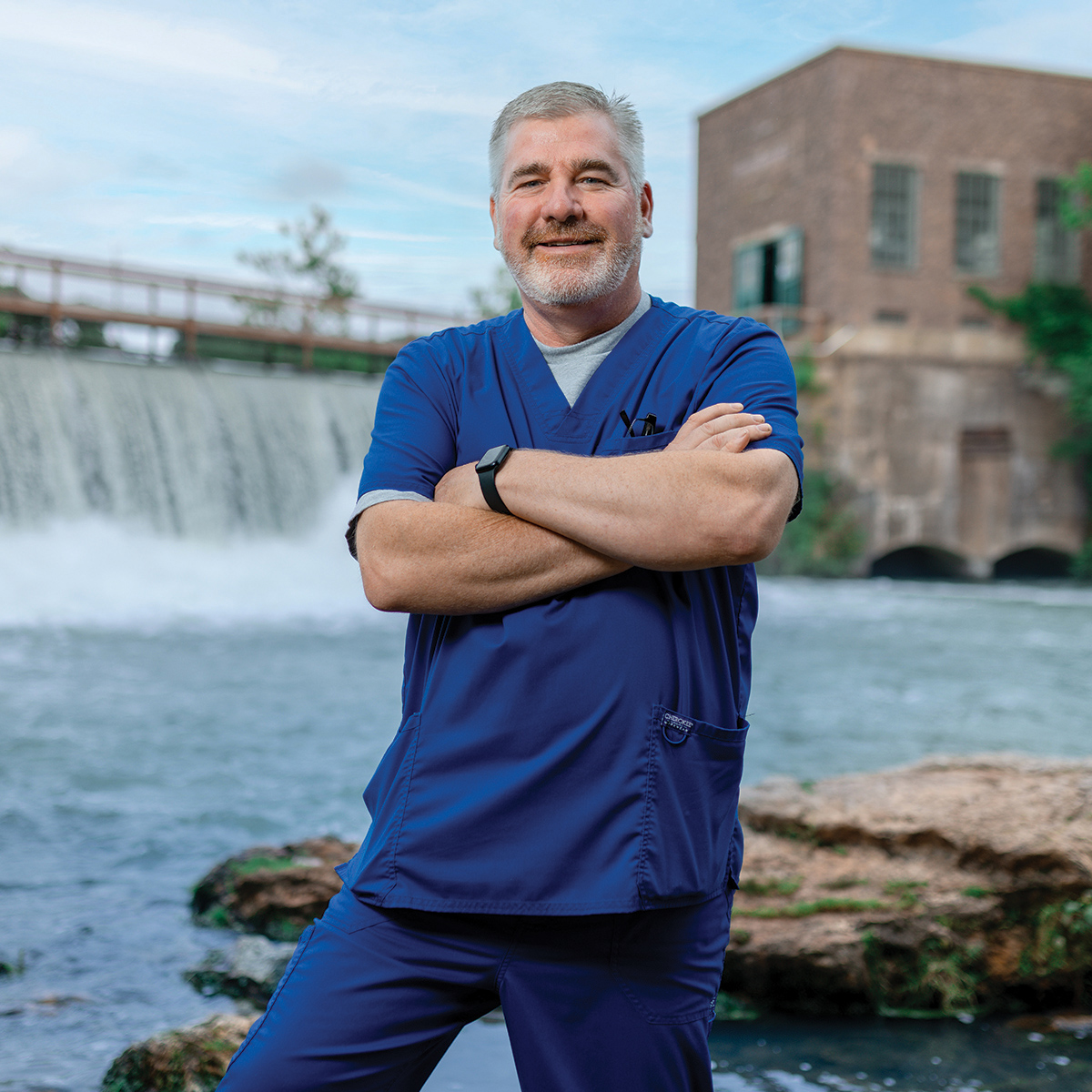Hometown Healing

Dr. Cochran provides compassionate care in Mammoth Spring
Reached at his home in Mammoth Spring, the small north Arkansas community where he grew up and was first inspired to pursue medicine, Dr. Chris Cochran asks the caller’s pardon for the racket outside his window.
“Just listening to the cicadas sing,” he said.
Mammoth Spring is the kind of place where the songs of the summertime warbler insects aren’t drowned out by excessive traffic, just as its thousands of fireflies’ brilliance isn’t diminished by neon and streetlights. It is also generally not the kind of place that can support its own resident physician, even one who cherishes the familiar confines of his hometown as Cochran does. Yet here he is, reporting to work at Baxter Health Cochran Internal Medicine Clinic where he serves a full slate of people, many of whom aren’t just patients but bit players in his life story.
“I’ve done colonoscopies on about four or five of my former teachers,” he quips. “Half the downtown has my cell phone number. That could get old in a hurry, I suppose, but it’s just part of the deal. It gives me a measure of augmentation that I didn’t expect.
“When I moved back to my hometown, I didn’t realize the joy of feeling that I’m as good as I am at what I do, not by virtue of comparing myself to my colleagues but just by the satisfaction of walking into a room for a follow-up and finding people are glad that I’m there. I do relish that.”
Cochran’s parents — his father a pharmacist and his mother a wildlife biologist — nurtured in him an early love for the sciences. After graduating with a degree in biology from Lyon College in Batesville, he headed for medical school at the University of Arkansas for Medical Sciences in Little Rock, then on to the University of Missouri Kansas City for his internship and residency. He spent the first decades of his medical career in nursing home and hospital work before deciding to return to Arkansas — for the first year on his own dime. If he had any illusions about the manner and degree to which small-town health economics had changed, that first year erased them.
“I can tell you, the old days are over for health care,” he said. “My accounts receivable just sat there and fermented for three or four months before I saw a dime come in. Thankfully my wife, Niki, is a savings disciple so we had a pretty good safety net. But I couldn’t have done it without that.”
Survive he did. Now with the backing of Baxter Health, Cochran is happily serving patients who appreciate it. They need him, that much is clear, but what was more of a revelation was how much he needed them back.
“It’s just a void in small towns across America as far as health care is concerned,” he said. “I’m here for the community, to help them, to bring real, qualified expertise. I think that the town really appreciates it because they know that they’re safer living here, and for me it has been so rewarding.”
The one question that keeps popping up among his colleagues and friends not from here is the emotional toll such work takes. “How can you handle treating people you know,” they ask, “or see suffering in old friends and classmates?”
“Well, you know, after so many years that emotion muscle is really honed, and I can channel that very well at this point,” he said. “What I’m into now is, I don’t want anybody else taking care of those people because I know they won’t do as good a job as I do. They simply won’t care in the same way I do.
“There was this poor lady, she was a couple of years behind me in high school and was just very unlucky and got two or three different cancers in her lifetime until finally one of them got her about a month ago. A man I know got lung cancer and brain cancer and showed up in my office not even hardly knowing his own name.
“People ask how can I take care of people I know like that, and I say it’s because I know them that makes me care about them on a different level than if they were just strangers who came into my office. It’s just a different connection and something I try to honor in how I treat them.”



